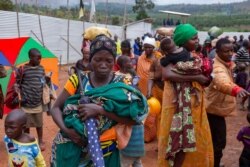More than 500 Burundians were returned to their home country from three Tanzanian refugee camps Thursday, marking the first wave in a massive effort to repatriate people fleeing violence and unrest over the last few years.
Burundians boarded buses at the Nduta, Mutendeli and Nyarugusu camps in western Tanzania, bound for two reception centers in their country's Ruyigi province. After spending the night, they were to be dispatched to their home provinces.
"Today, we repatriated more than 500 refugees who had registered to return voluntarily," said Athuman Igwe, a Tanzanian government official in charge of refugee affairs in Kigoma. "We will continue to do so, because we believe there is no reason for refugees to stay in camps."
The U.N. refugee agency has estimated the Tanzanian camps hold almost 184,000 Burundians who are to be sent home by year's end, based on the bilateral pact. They are among nearly 350,000 Burundians who have fled the small, Central-East African country's political unrest, which erupted after a controversial 2015 election gave President Pierre Nkurunziza a third term. Some went to other neighboring countries.
Forced returns?
When the bilateral repatriation deal was announced in late August, it sparked fears of forced returns among some of those who crossed the border to escape violence.
As recently as last week, a spokesman for the U.N. refugee agency expressed concern.
"Many refugees and asylum-seekers who have even recently arrived in Tanzania have cited persecution and fear of human rights abuses as the reason for their entry into Tanzania," UNHCR spokesman Bob Baloch said. "So, we hope that Tanzania … will not put refugee lives at risk by putting pressure on them to return back home."
On Thursday, Catherine Wiesner, the U.N. refugee agency's Nairobi-based coordinator for the Burundi situation, offered reassurance. "The refugees and the asylum-seekers who departed today" left voluntarily, she said.
However, a refugee in Nduta camp suggested otherwise.
"Many had earlier requested to return voluntarily but later changed their mind. Nonetheless, they were repatriated," said the individual, who asked to remain anonymous out of fear of retribution.
Some refugees are reluctant to go home, citing continuing violence in Burundi.
"The Tanzania government believes in Burundi's government narrative that the country is safe. But for us, the reasons that forced us to flee have not yet been resolved," said Elie Miburo, a resident of Nyarugusu camp.
"We are banned from doing some agricultural activities around the camp, a food market inside the camp has been closed. This is a clear indication that Tanzanian authorities want to repatriate us by force," he added.
Cash, supplies
The repatriated Burundians were sent back with cash grants, "some in-kind supplies and some household items," Wiesner said, adding that the UNHCR is working with partners "to mobilize more support for reintegration at the community level once people are home."
The U.N. refugee agency has been working with Burundi's and Tanzania's governments on ongoing voluntary return operations since September 2017, Wiesner said.
She said she expected the repatriation effort would resume next week.
Patrick Nduwimana reports for VOA's Swahili Service and Edward Rwema reports for its Central Africa Service. Both are in Washington.







